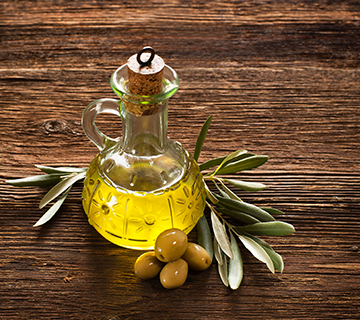8 Healthy Cooking Oils to Try This Fall

Looking to make some healthy additions to your diet this fall? As the season starts to change, try cooking with these 8 healthy oils.
1. Olive Oil
There is a range of different types of olive oils on the market today. Pure olive oil has a higher smoke point, which makes it better for cooking at higher temperatures. The fruity flavor of virgin or extra-virgin olive oil is great for finishing dishes. Try a drizzle over roasted potatoes, or toss with fresh spinach, walnuts, apple slices, and crumbled blue cheese for a savory fall salad.
2. Sesame Oil
Use sesame oil to create Asian-inspired dishes. This oil is nutty and fragrant, and a little adds a lot of flavor. Try tossing rice noodles in a few tablespoons of sesame oil, then topping with a pile of fresh, Asian cabbage slaw for a delicious and filling lunch. Sesame oil is rich in linoleic acid and mono- and polyunsaturated fats, which can help cut bad cholesterol and promote heart health.
3. Canola Oil
The light flavor of canola oil makes it very versatile. When you cook or bake, try replacing fats like butter or margarine with canola oil. Use it to grease baking pans or your grill—or for stir frying. Canola is low in saturated fat and is a good source of mono-and polyunsaturated fats, including omega-3s.
4. Flaxseed Oil
Flaxseed oil has a low smoke point, so it’s best used as a finishing oil, not for cooking over heat. Drizzle a little over cooked quinoa, or use it to toss salad. It packs a lot of power nutritionally. Flaxseed oil is so high in omega-6 and omega-9 fatty acids that it’s often recommended as a vegetarian alternative to fish oil.
5. Peanut Oil
Compared to flaxseed oil, peanut oil has a very high smoke point, which makes it great for cooking over high heat. Use it to add a nutty flavor to stir-fries and ginger dressing. Peanut oil is an excellent source of phytosterols, which help prevent your body from absorbing harmful cholesterol.
6. Grapeseed Oil
Grapeseed oil also has a high smoke point, but a very mild flavor. It’s a fantastic, subtle oil for sautéing. Use it when you don’t want the flavor of your oil to overpower your dish. It’s extracted from the grape seeds, which are a byproduct of winemaking, and contains compounds that have been shown to lower cholesterol.
7. Virgin Coconut Oil
Virgin coconut oil is a good way to add tropical flavor to chicken, curry and vegetable dishes. Virgin coconut oil is extracted from the fruit of mature coconuts and is high in lauric acid, which helps raise both good and bad cholesterol levels. Because it’s a saturated fat, use it in moderation.
8. Walnut Oil
Walnut oil starts to break down with high heat, so it’s best used as a finishing oil. Try using it to dress salads—or drizzle over pasta and serve with earthy, sautéed mushrooms. Walnut oil is made from nuts that are dried, then cold pressed. It’s high in alpha-linoleic acid, which helps support heart health.